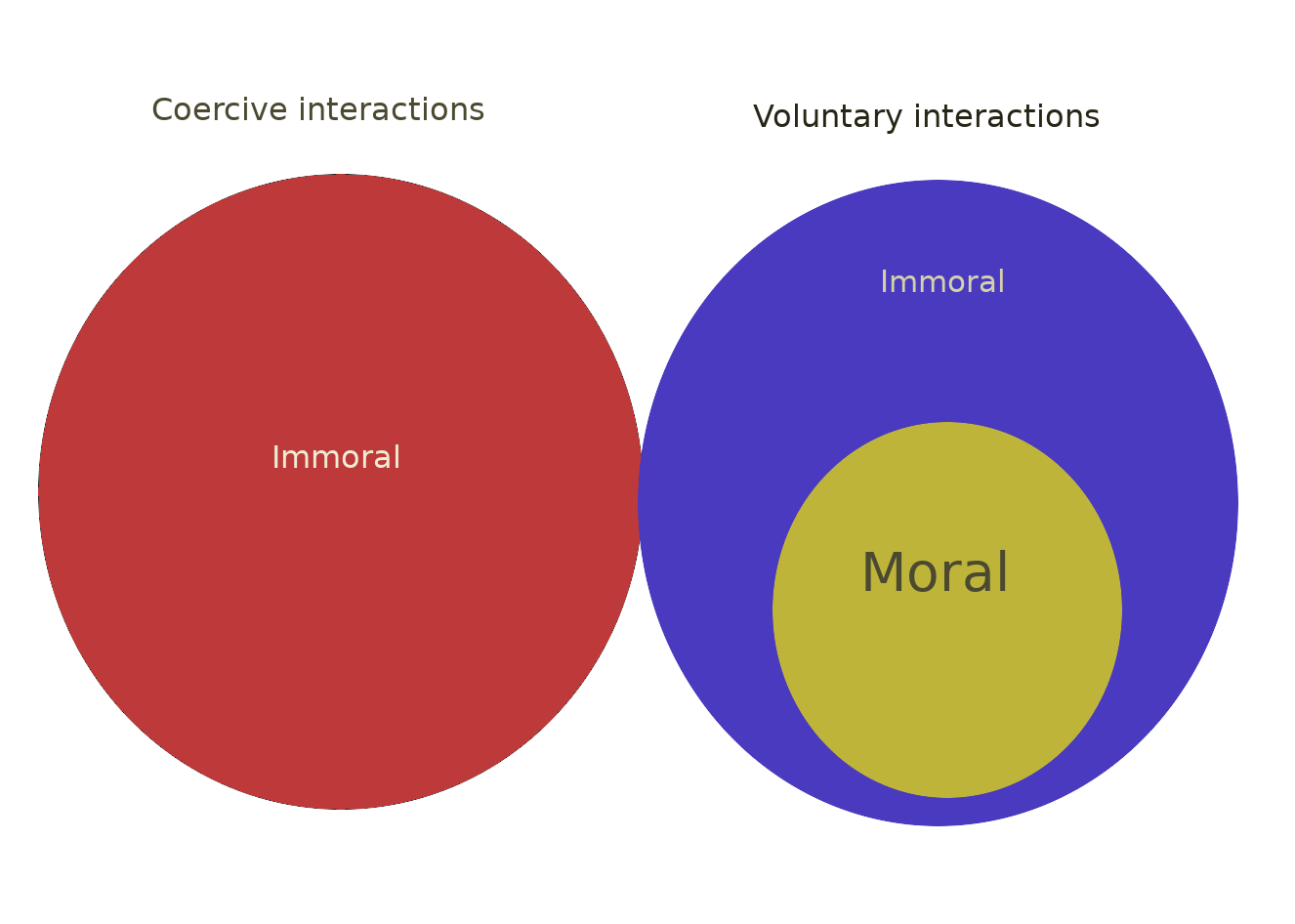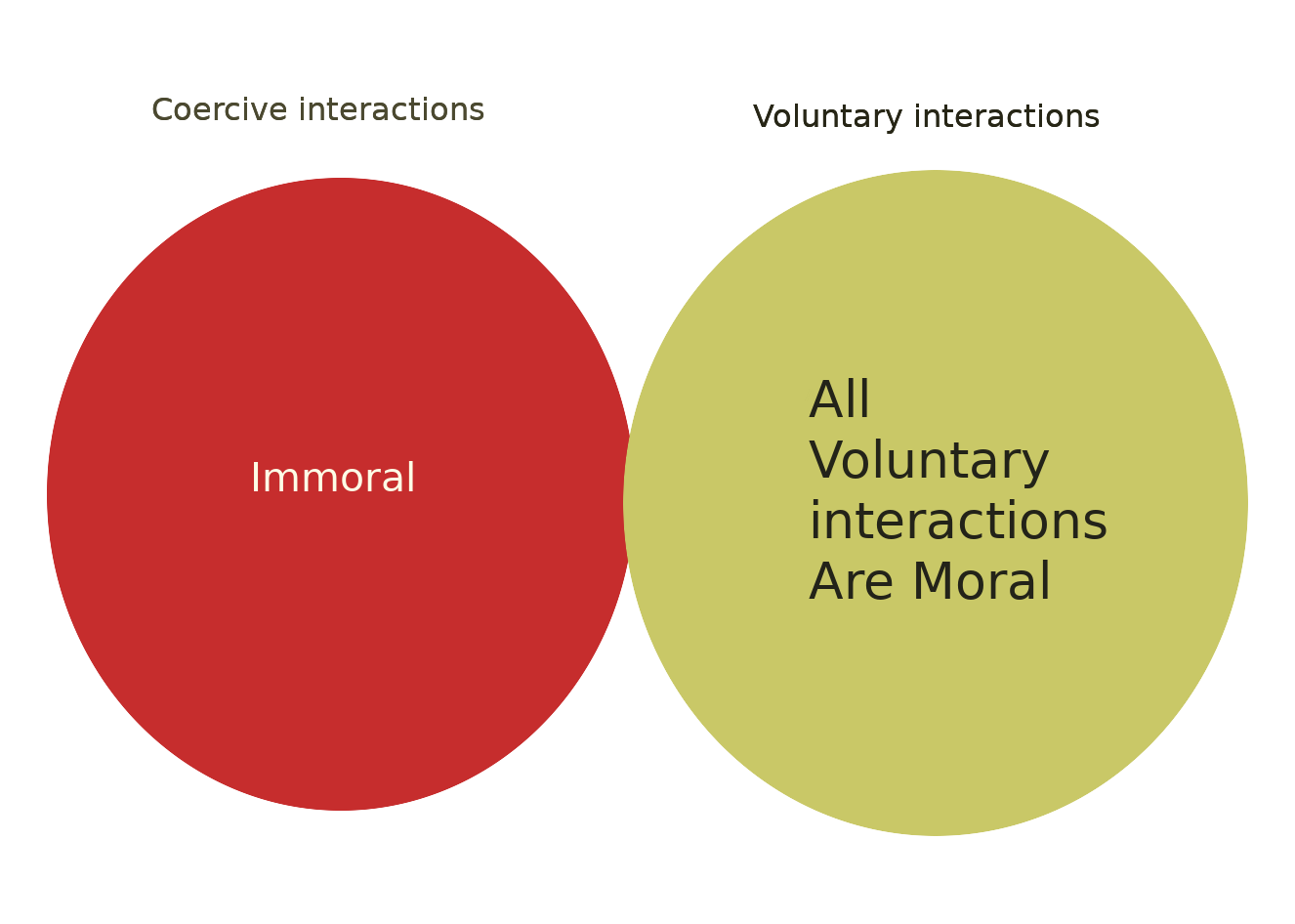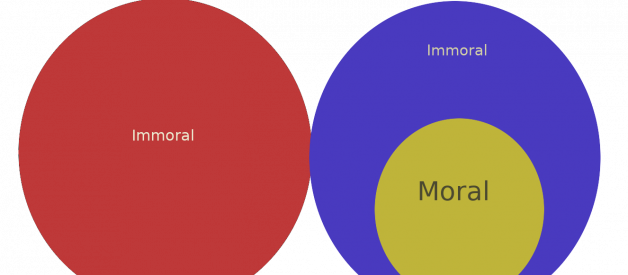A new take on thick vs. thin libertarianism
 A Venn diagram comparing morality with coercion and voluntaryism
A Venn diagram comparing morality with coercion and voluntaryism
?Left-libertarians? are usually anarcho-communists, mutualists, or non-state socialists of some variety. State socialism is socialism enforced by the state, whereas non-state socialism is voluntary sharing amongst people or groups. Generally left-libertarians believe that one or more of these things should be considered true:
- Rent is immoral ? nobody should be able to lease or rent property to another person. Instead the person renting should be able to own at least one property.
- Owning multiple properties (land titles) is immoral.
- Properties that go unoccupied for a certain time period can be rightfully seized by squatters.
- All workers should own roughly an equal portion of their company, that means that all workers become owners or stakeholders.
Generally speaking, the above amounts to: Nobody should be able to own more than their ?fair share? of something, whatever that is.
The libertarian belief system is founded on the idea that all human interaction should be voluntary. Coercive action, at least the initiation of coercive action, is inherently immoral. There are tons of logical problems with left-libertarian philosophy, mostly decision problems???who decides how long a property is unoccupied before someone else can move in? And if we consider certain voluntary actions to be immoral, then which outside forces are going to prevent this immoral activity from happening? Do we just educate people that these things are immoral, or do we start using force to force people not to do them? Etc.
So here is where we get to the juicy bit. While left-libertarians seem to only deem a subset of voluntary actions to be moral, I believe that standard libertarian philosophy considers all voluntary actions/interactions to be moral.
Ultimately libertarians believe:
(a). Only voluntary actions are moral. Coercion is inherently immoral. We might call this thin libertarianism.
and they also believe that:
(b). All voluntary transactions between two parties are inherently moral. We might call this thick libertarianism.
The problem is, left-libertarians don?t meet (b), the second criterion. As we can see above, left-libertarians believe that certain voluntary actions are immoral: rent (the voluntary transaction between tenant and landlord), or the voluntary transaction between business owner and salaried employee, etc.
So if we accept that (b) is required to be libertarian, then the only argument that left-libertarians can reasonably make is that certain voluntary transactions between two parties negatively affect 3rd parties. That is a valid line of reasoning, but not the one they usually choose to indulge in. So, from my perspective, the burden of proof is on left-libertarians to demonstrate that the voluntary transactions between 2 parties are immoral because they negatively impact 3rd parties.
So we can see that left-libertarians might believe something like this:

As we can see from the above diagram ? we can give left-libertarians the benefit of the doubt and assume they consider all coercion to be immoral, but we can see that they consider a significant amount of voluntary interaction to be immoral!
So the question is ? if left-libertarians consider certain voluntary actions/interactions to be immoral, then what do we do about that? Do we try to mitigate those immoral actions with coercive control, or do we try to educate people and convince them that they or society as a whole would be better if they abstained from those actions?
I would argue that libertarians truer to the ideology would believe that all voluntary interactions that don?t harm 3rd parties are moral:

The fact that some libertarians consider commonplace voluntary interactions like workers accepting a salary instead of stock ownership or a landlord/landlessor relationship to be immoral is problematic.
Perhaps left-libertarians can try to steal the word libertarian for themselves and change the definition. But would left-libertarians dare to call themselves voluntaryists? I haven?t heard any bold enough to try.
TL;DR
Thin libertarianism ? only voluntary interactions are moral.
Thick libertarianism ? all voluntary interactions are moral.
__
Yours truly,
Alexander von Daneman


